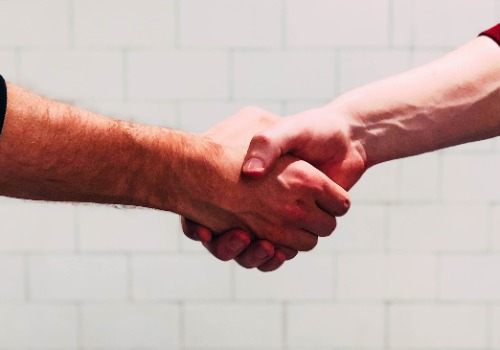When did handshakes first begin?
The origins of the handshake date way back to ancient Greece, often used as a display of trust. You can even see an ancient funeral stone depicting two soldiers shaking hands in the Pergamon Museum in Berlin.
Throughout history, handshakes have been used to demonstrate friendship, commitment and respect. Popular theories suggest handshakes originally developed so that strangers or enemies could demonstrate they weren’t holding any weapons. The gesture of two clasped hands also symbolises a bond or seal of alliance, suggesting handshakes were originally pledges of trust and respect.
However, the use of a handshake as a daily greeting is a little more recent. These days people shake hands around 15,000 in their lifetime on average.
Handshakes have been part of everyday greeting etiquette since the 1800s… so why stop now?
Why is the world banning handshakes?
Coronavirus is transmitted through respiratory droplets produced by coughs or sneezes. These can be spread by touching a surface or object that is contaminated with the virus.
Generally speaking, we carry 3,200 bacteria from 150 different species on our hands. So it’s easy to see how shaking hands can easily spread bacteria between people – including potentially infectious diseases. If someone’s hand is contaminated with coronavirus, from coughing or sneezing, they could very easily pass this on through a handshake.
The ultimate guide to alternative handshakes
We get it. Social convention means we’re practically programmed to extend our hand when we meet new people, or at the beginning and end of a meeting.
So, with handshakes now a no-go zone for many, what are the alternative greetings for businesspeople?
- Contactless high-fives
- Wave
- Air kisses
- A nod and a smile
- Elbow or fist bumps Did you know that fist bumps transmit 90% fewer bacteria compared to handshakes?
- Stick out your tongue (Tibetans do this)
- Bow or courtesy (this one is a little formal, but it’s common in Japan to bow as a greeting)
- The ‘Wuhan Shake’ (touching of feet)
- The Thai Wai (a traditional greeting in Thailand, consisting of a slight bow with palms pressed together)
- Do the live long and prosper sign (don’t actually do this one)
In all seriousness, preventing the spread of coronavirus is a priority and both individuals and businesses must do all they can to promote good hygiene and hand-washing etiquette. For more information on coronavirus and how it could impact your business, please check out our other blogs on the subject.

